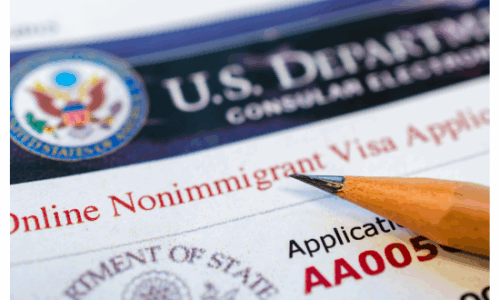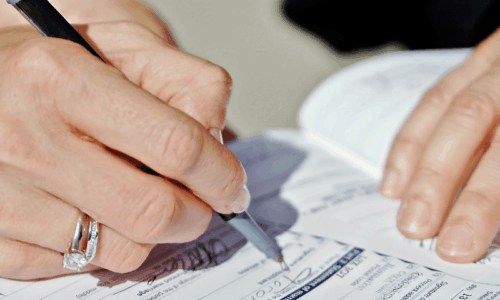- All
- Criminal
- Custody
- Family
- Immigration
- Marriage and Family Visa
What kind of questions are on the citizenship test?
The citizenship test includes questions on U.S. history, government, foreign affairs, and current legal matters. It’s recommended to study with practice tests and seek help from an immigration attorney to prepare.
Read More How long does the citizenship process take?
The application (Form N-400) processing time is around 8–13 months, but the time it takes to complete the entire naturalization process can be anywhere from 16 to 22 months. However, there are many factors that can affect the timeline of legally immigrating.
Read More Can US citizenship be revoked?
Yes, U.S. citizenship can be revoked through a process called "denaturalization," though it is rare. Grounds for denaturalization include falsifying information, refusing to testify before Congress, membership in subversive groups, or a dishonorable military discharge.
Read More Do I lose citizenship with my home country if I apply for citizenship in the United States?
The United States does allow dual citizenship, and they will recognize it when you become a US citizen. However, the eligibility requirements are not the same in every country.
Read More What happens if my marriage-based green card is denied?
If your green card is denied you have the right to appeal the decision. Contact us today to speak to an attorney about your options!
Read More What will take place during the interview?
You may be asked various questions about your relationship and marriage. Our team at Rozas are able to assist you with questions that may be asked during your interview.
Read More What is the difference between “conditional resident” and “permanent resident”?
A conditional resident is someone who has been married for less than two years when approved for residency and holds a conditional resident card. After two years of marriage, they must submit a form to remove the condition and obtain permanent residency, which provides full rights and benefits without restrictions.
Read More How do I apply for a green card for my spouse?
You are able to apply for an adjustment of status through Form I-485, filed together with Form I-130 if you and your spouse both live in the United States and your spouse entered the country legally on a visa or parole. You may need to use Form I-130 followed by consular processing if your spouse lives outside of the United States or if you both reside outside the country.
Read More What Happens When You Get a DUI in Louisiana?
A DUI conviction in Louisiana can result in jail time, fines, community service, license suspension, and other penalties, depending on prior offenses. It stays on your record for life, potentially impacting job applications, loan approvals, gun purchases, and increasing insurance rates.
Read More What is the Difference Between 42A and 42B Immigration?
The difference between 42A and 42B immigration is that 42A applies to green card holders facing removal, while 42B is for individuals without permanent residency who have strong ties to the U.S. and have lived there for many years.
Read More What is an Alien Registration Number (A-Number)?
An Alien Registration Number (or A-number) is a unique number essential for tracking your immigration journey, from applying for residency to securing U.S. citizenship. Whether you’re filing a green card application, applying for a work permit, or petitioning for a visa, your A-number plays a crucial role in keeping your paperwork in order.
Read More What is DACA?
DACA, or Deferred Action for Childhood Arrivals, is a program that offers a lifeline to undocumented individuals who came to the U.S. as kids. It helps protect them from deportation and allows them to work legally.
Read More What Is The Cost of Child Custody Evaluation in Louisiana?
The cost of a child custody assessment depends on the evaluator's experience, case complexity, and the duration of the assessment. More experienced evaluators, complex cases, and longer assessments generally result in higher fees.
Read More Can You Get a DUI Expunged in Louisiana?
Technically no, you cannot get a convicted DUI expunged in Louisiana. However, there are specific situations where you can avoid having it on your record, but you have to meet particular criteria to be eligible.
Read More What Are the Documents Required for a K-1 Visa?
Here’s a quick breakdown of the essential K-1 visa document requirements: proof of U.S. citizenship, evidence of a genuine relationship, financial support documents, police clearance certificates, a medical exam report, and a few additional identity documents like passport photos and the DS-160 confirmation page.
Read More What Are The Requirements to Sponsor an Immigrant?
To sponsor an immigrant, the sponsor must be a U.S. citizen or lawful permanent resident, at least 18 years old, and reside in the U.S. They must also prove they can financially support the immigrant at 125% above the poverty level.
Read More Is there a separation requirement in Louisiana?
Yes. Spouses must live completely apart from one another for 180 days when there are no children involved. If they have kids, the divorcing couple must be separated for 1 year. If the divorce is fault-based, the couple will have to spend 2 years living separately before the divorce will be finalized.
Read More How to Find a Good Immigration Lawyer
To find a good immigration lawyer, research their experience, reputation, and success rates, and consider seeking referrals from trusted sources or professional organizations. Look for a reputable attorney like Rozas.
Read More How long does a divorce take?
In Louisiana, a no-fault divorce can take between 6 months and a little over a year, depending on child status. In fault-based divorces, the process will take at least 2 years.
Read More How Much Does an Immigration Lawyer Cost?
The cost of an immigration lawyer varies depending on factors such as the complexity of the case, the attorney's experience, and the services required. Read our detailed FAQ to learn more.
Read More How Much Does a DUI Cost in Louisiana?
The cost of a DUI in Louisiana varies depending on the offense, with fines ranging from $300 to $1,000 for a first offense, $750 to $1,000 for a second, $2,000 for a third, and $5,000 for a fourth. Additional costs may include fees for a breathalyzer interlock device, court-approved substance abuse programs, and other related expenses.
Read More Do divorce laws vary by state?
Yes. There are as many divorce laws as there are states. Even neighboring states can have completely different laws than each other.
Read More Do I need grounds for a divorce in Louisiana?
No, Louisiana divorce laws allow couples to file for divorce just based on the fact that they are living separately and apart from one another.
Read More Can a Lawyer Expedite My Immigration Case?
An experienced lawyer can possibly expedite your immigration case by: ensuring all paperwork is accurate, efficiently navigating complex legal procedures, and proactively advocating with immigration authorities to address and resolve delays. Contact us today to learn more!
Read More Can You Get a DUI on a Bike?
You cannot get a DUI on a bike because the law applies to people operating a motor vehicle. The penalty for riding a bicycle drunk would be a ticket for public intoxication and possibly not following traffic laws.
Read More 
.svg)
























